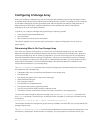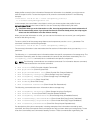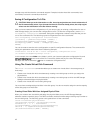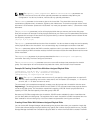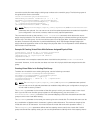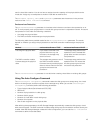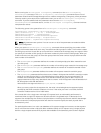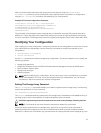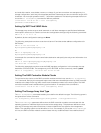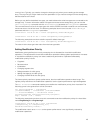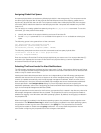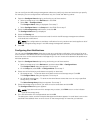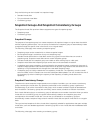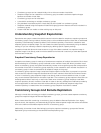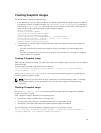
as virtual disk creation, reset, delete, rename, or change. If you have more than one storage array in a
storage configuration, each array has a separate password. Passwords can have a maximum length of 30
characters. You must put quotation marks (" ") around the password. The following example shows how
to use the set storageArray command to define a password:
client>smcli 123.45.67.89 -c "set storageArray
password=\"1a2b3c4d5e"\;"
Setting Up SMTP And SNMP Alerts
The storage array can be set up to send automatic e-mail alert messages to specified email addresses
when specific events occur. View the current alert configuration settings using the following command:
SMcli -d -i -s -w -v -S
By default, all alert configuration settings are None.
The following example shows how to set the mail server IP and the sender address configurations for
SMTP alerts:
SMcli -m 123.45.67.892 -F
MyStorageArrayEvent@MyCompany.com
or
SMcli -m MyCompany.com -F
MyStorageArrayEvent@MyCompany.com
An example of a command to set the email alert destination and specify that only event information is to
be sent is:
SMcli -a email:MyCompanySupport@MyCompany.com
123.45.67.89 -I eventOnly
The following example shows how to set the SNMP trap alert configuration. In this example, the trap
destination is 123.45.67.891. The storage array is 123.45.67.892, and the community name is public.
SMcli -a trap:public, 123.45.67.891 123.45.67.892
Setting The RAID Controller Module Clocks
To synchronize the clocks on the RAID controller modules with the host, use the set storageArray
time command. Running this command helps ensure that event timestamps written by RAID controller
modules to the Major Event Log (MEL) match event timestamps written to the host log files. The RAID
controller modules remain available during synchronization. An example of the command is:
client>smcli 123.45.67.89 -c "set storageArray time;"
Setting The Storage Array Host Type
The set storageArray command enables you to define the default host type. The following syntax is
the general form of the command:
set storageArray defaultHostType=(hostTypeName | hostTypeIdentifier)
The defaultHostType parameter defines how the RAID controller modules communicate with the
operating system on undefined hosts connected to the storage array. This parameter defines the host
type only for storage array data I/O activities; it does not define the host type for the management
station. The operating system can be Windows or Linux. For example, if you set the defaultHostType
to Linux, the RAID controller module communicates with any undefined host if the undefined host is
48



